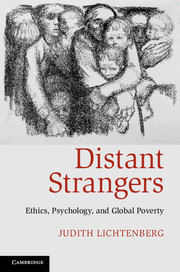Book contents
- Frontmatter
- Dedication
- Contents
- Preface
- Chapter 1 Introduction
- Chapter 2 Entanglements and the claims of mere humanity
- Chapter 3 Duties and rights, charity and justice
- Chapter 4 “Negative” and “positive” duties
- Chapter 5 Oughts and cans
- Chapter 6 Why people do what others do – and why that’s not so bad
- Chapter 7 Whose poor?/who’s poor?: deprivation within and across borders
- Chapter 8 Hopefully helping: the perils of giving
- Chapter 9 On motives and morality
- Chapter 10 Conclusion: morality for mere mortals
- Works cited
- Index
Chapter 3 - Duties and rights, charity and justice
Published online by Cambridge University Press: 05 June 2014
- Frontmatter
- Dedication
- Contents
- Preface
- Chapter 1 Introduction
- Chapter 2 Entanglements and the claims of mere humanity
- Chapter 3 Duties and rights, charity and justice
- Chapter 4 “Negative” and “positive” duties
- Chapter 5 Oughts and cans
- Chapter 6 Why people do what others do – and why that’s not so bad
- Chapter 7 Whose poor?/who’s poor?: deprivation within and across borders
- Chapter 8 Hopefully helping: the perils of giving
- Chapter 9 On motives and morality
- Chapter 10 Conclusion: morality for mere mortals
- Works cited
- Index
Summary
Suppose you are convinced by one or more of the arguments outlined in the last chapter not only that global poverty is a great evil but that it exerts some moral force on you. I believe each of these arguments – agreements, harm, exploitation, community, humanity – has merit. If so, we then confront the question of how much in the way of responsibility they imply, separately or together. Leaving aside their aggregate force, let’s focus now on the humanitarian argument. Recall its simplifying advantage of not relying on possibly controversial empirical assumptions – assuming neither that agents who may be responsible for alleviating poverty have contributed to causing it nor even that they benefit from it or take advantage of its victims. This assumption is also in some ways a drawback, insofar as evidence of harm creates greater moral force than the simple conjunction of need and ability assumed by the humanitarian argument. Still, the latter possesses a certain power of its own.
The clearest way to express the idea of moral force is to say that a person’s claim of dire need gives others some reason to act to alleviate it. But how much reason does it give them? This question has preoccupied contemporary moral philosophers ever since Peter Singer published his groundbreaking article “Famine, Affluence, and Morality” in 1972. As we saw in Chapter 1, Singer there argues that a person ought to aid the poor up to the point where giving more would make the agent as badly off as those she is helping. Singer seems to mean (and others have taken him to mean) that it is wrong not to give this much and that one is morally obligated to do so. Most people, including most philosophers, disagree with this radical conclusion. They think Singer demands too much of ordinary people, who cannot be obligated to give so much, especially to those with whom they have no special relationship – and much effort has gone into explaining why he is mistaken. Since Singer offers a utilitarian argument, it may seem easy to reject his conclusion by rejecting utilitarianism, which many do. Still, the thrust of his view – that it is wrong for some to live in luxury or great comfort while others barely survive – possesses power even when shorn of utilitarian connections.
- Type
- Chapter
- Information
- Distant StrangersEthics, Psychology, and Global Poverty, pp. 47 - 72Publisher: Cambridge University PressPrint publication year: 2013



